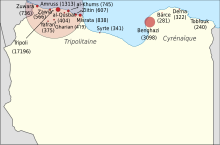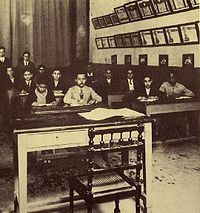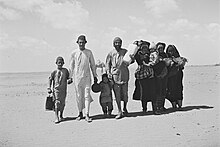| 1945 Anti-Jewish riots in Tripolitania | |
|---|---|
 Jews in Italian Libya (number of Jews in each city) Jews in Italian Libya (number of Jews in each city) | |
| Location | Tripoli, British Tripolitania |
| Date | 5–7 November 1945 |
| Target | Libyan Jews |
| Attack type | Violent pogrom, massacre |
| Deaths | 140+ Libyan Jews killed |
| Injured | Hundreds of Jews injured |
| Perpetrators | Muslim Libyan rioters |
The 1945 Anti-Jewish riots in Tripolitania was the most violent rioting against Jews in North Africa in modern times. From November 5 to November 7, 1945, more than 140 Jews were killed and many more injured in a pogrom in British-military-controlled Tripolitania. 38 Jews were killed in Tripoli from where the riots spread. 40 were killed in Amrus, 34 in Zanzur, 7 in Tajura, 13 in Zawia and 3 in Qusabat.
The British Military Administration was heavily criticized for acting too slowly to stop the rioting. Major-General Duncan Cumming, the British Chief Civil Affairs Officer, noted that Arab nationalism had been provoked by reports about Council of Foreign Ministers proposals "to hand the country back to Italian tutelage or to some other country with suspected Colonial designs," and that "It would seem that reports of the situation in Palestine and of anti-Jewish disturbances in Egypt finally touched off the pent-up excitement in the direction of the virtually defenceless Jews rather than against Italians. Hooliganism and fanaticism have played an important part in the disturbances together with a general tendency to loot." Official British reports highlight background factors responsible for the general tension at the time, such as economic hardship and the uncertain political future of Tripolitania. The neighbouring British province was expect to become the independent Cyrenaica Emirate, whilst contemporary post-war proposals for Tripolitania included a return to Italian rule and a trusteeship under the Soviet Union.
At least 550 Libyans were arrested for their suspected involvement in the pogrom.
As a result of the slow British response, a widely held belief amongst Libyan Jews is that the riots were instigated by the British in order to show that the Libyans could not rule themselves, or as some kind of warning to Libyan Zionists relating to the ongoing Jewish insurgency in Palestine against British rule. However, American diplomats believed that the British had been caught unaware and "were sincere in their desire to curb outbreaks promptly". State Department observer John E. Utter "believed that blame for the initial troubles lay with both sides—Jews primed for provocative behavior by Zionist propaganda and Arabs stirred by anti-Jewish riots in Cairo."
Together with previous persecutions of Jews by the Axis in Libya during World War II, the Tripoli rioting became a turning point in the history of Libyan Jews, becoming a central factor in the 1949–51 emigration organized by the Jewish Agency.
Background
Main articles: Italian Libya and The Jews of Libya during the HolocaustIn the late 1930s, the Fascist Italian regime in Italian Libya began passing antisemitic laws. As a result of these laws, Jews were fired from government jobs, some were dismissed from government schools, and their citizenship papers were stamped with the words "Jewish race."

Despite this repression, that was partially opposed by governor Italo Balbo, in 1941 some 25% of the population of Tripoli was still Jewish and 44 synagogues were maintained in the city.
But in February 1942, German troops fighting the Allies in North Africa occupied the Jewish quarter of Benghazi, plundering shops and deporting more than 2,000 Jews across the desert. Sent to work in labor camps, more than one-fifth of this group of Jews perished.
Despite liberation from Fascist Italian and Nazi German influence in 1943, North African Jews kept suffering attacks. Arab nationalists were incorporating effective propaganda efforts and on November 2, 1945, an anniversary of the Balfour Declaration, a widespread wave of anti-Jewish rioting hit the cities in Aleppo (Syria), Cairo (Egypt) and the most severe, in Tripoli (Libya).
The pogrom
Some of the worst anti-Jewish violence occurred following the liberation of North Africa by Allied troops. From November 5 to November 7, 1945, more than 140 Jews (including 36 children) were killed and hundreds more injured in the Tripoli pogrom. The rioters looted nearly all of the city's synagogues and destroyed five of them, along with hundreds of homes and businesses. In the aftermath about 4,000 Jews were left homeless, and 2,400 were reduced to poverty. Five synagogues in Tripoli and four in provincial towns were destroyed, and over 1,000 Jewish residences and commercial buildings were plundered in Tripoli alone. Many Jews in al-Kusbat converted to Islam in order to avoid being massacred.
As in the Iraqi case, the Tripoli massacre inaugurated a train of events that would demoralize and in a relatively short time dissolve the Libyan Jewish community. The event caused the beginning of the Libyan Jewish exodus. Thus, Jews began leaving Libya three years before the establishment of Israel and seven years before Libya gained independence.
Aftermath
| Part of a series on |
| Jewish exodus from the Muslim world |
|---|
 |
| Background |
| Antisemitism in the Arab world |
| Exodus by country |
| Remembrance |
| Related topics |
At least 550 Libyans were arrested for their suspected involvement in the pogrom. They were tried for their involvement by British military courts.
The situation of Libyan Jews further escalated with the eruption of the 1948 Arab–Israeli War. In June 1948, anti-Jewish rioters in Libya killed another 12 Jews and destroyed 280 Jewish homes. This time, however, the Libyan Jewish community had prepared to defend itself. Jewish self-defense units fought back against the rioters, preventing dozens of more deaths.
The insecurity which arose from these anti-Jewish attacks, as well as the founding of the state of Israel led many Jews to emigrate. From 1948 to 1951, and especially after immigration became legal in 1949, 30,972 Jews immigrated to Israel.
During the next decade and a half, the remaining Jews in Libya were put under numerous restrictions, including laws which governed their ability to move around (generally outside the country), their legal status and identification cards and property issues; the Jews of Libya were discriminated against and oppressed through codified laws. More violence erupted after the Six-Day War, leaving 18 Jews dead and many more injured. Following this, the remaining Jewish community of Libya, numbering about 7,000 persons, was almost entirely evacuated to Italy, abandoning their property and homes. The last Jew in Libya, an old woman, was finally allowed to leave for Italy in 2003, after numerous tries by her adult son.
See also
- History of the Jews in Libya
- Jews of Libya during the Holocaust
- Farhud – 1941 anti-Jewish massacre in Baghdad, Iraq
- 1945 Anti-Jewish riots in Egypt
- 1948 Anti-Jewish riots in Tripolitania
References
- Goldberg, p112
- Bills 1995, p. 41: "The local British Military Administration was stung by criticism that it moved too slowly to contain the violence. Chief Civil Affairs Officer D. C. Cumming asserted that though there were twenty thousand Jews in Tripoli, there was little history of Arab-Jewish hostility in the city or province. The situation had changed, said Cumming, when a smoldering Arab nationalism was fanned by provocative press reports about CFM proposals "to hand the country back to Italian tutelage or to some other country with suspected Colonial designs." Further, he wrote, "It would seem that reports of the situation in Palestine and of anti-Jewish disturbances in Egypt finally touched off the pent-up excitement in the direction of the virtually defenceless Jews rather than against Italians. Hooliganism and fanaticism have played an important part in the disturbances together with a general tendency to loot." Cumming said that the BMA had acted quickly to restore order and minimize casualties once the seriousness of the situation was understood."
- Goldberg 1990, p. 113 #2: "In contrast to this explanation, official British reports, which also underline that the riots were unexpected, tend to point to a variety of factors, without singling out a major cause or assigning responsibility. Such background factors are not difficult to locate. Economically, the province of Tripolitania was still struggling with the dislocations of war. Many people had come to the city from the countryside seeking employment, which was not to be found. Along with the economic stress was considerable political anomie. Tripolitania had been freed from Italian rule by the British, but its political future was uncertain. Promises of independence had been made to the neighboring province of Cyrenaica, where Sanusi forces actively had abetted the Allied effort, but no commitments had been made to Tripolitania. Various proposals about the political future had been offered, including return to colonial status under Italy and, later, a trusteeship under the Soviet Union."
- ^ Daniel, Clifton (November 13, 1945). "3 BRITISH COURTS TRY LIBYA RIOTERS". The New York Times.
- Goldberg 1990, p. 113 #1:"It is useful to start with a hypothesis widely held by Libyan Jews—that the riots were instigated by the British.. attempting to show that native Libyans were incapable of ruling themselves, or that they were seeking to warn Jewish activists in Palestine who were militantly opposed the British mandate there."
- The Libyan Arena, Scott L. Bills, p.175, "For a report from an American serviceman who blamed the riots on the "skilled hands of British engineers," see Sgt. Joseph Sweben, Tripoli, to Truman, 9 November I945, 865C.oo/II-945, RG 59, DSNA. The sergeant believed that British authorities could have stopped the rioting "in five minutes flat" if they had acted decisively. Instead, "Arabs ran wild through the streets of Tripoli on the evening of November 4th."
- Bills 1995, p. 42: "The American vice-consul in Tunis offered a similar analysis. He advised, "My own opinion is that British, who with Jews, were caught unawares... were sincere in their desire to curb outbreaks promptly but that they were more anxious not to do anything which would bring hostility of Arab world upon them and were thus hesitant in taking strong measures promptly." A later report by State Department observer John E. Utter, based on extensive interviews in Tripoli, found "that this pogrom was uninspired and unexpected." The British were slow to respond for fear of being accused of fascistic methods, and Utter believed that blame for the initial troubles lay with both sides – Jews primed for provocative behavior by Zionist propaganda and Arabs stirred by anti-Jewish riots in Cairo. Worsening economic conditions contributed to an ugly mood in the capital, said Utter. The "horde of unemployed roving about Tripoli streets was ripe to enter into any disorder which might furnish an opportunity for looting. The Jews were the richest target." For American officials, the Tripoli riots of early November suggested neither British anti-Semitism nor imperial conniving. The outbreaks were, however, a sure sign that Near East affairs could turn violent in this and other ways if the big powers were unable to reach a satisfactory agreement."
- Goldberg 1990, p. 122: "A number of years, and additional political upheavals, were to pass before the State of Israel emerged as a reality, and not until Spring 1949 did the British administration give permission to the Jewish Agency to organize immigration to Israel. There is little doubt however that the riots, separated from the mass immigration by about four years, were a central factor in bringing it about. Although Jews probably would eventually have left an independent Libya, as they have the other countries of the Maghrib, under different circumstances the emigration might have been more gradual, as in the cases of Morocco or Tunisia.
- *La colonisation italienne en Libye (1911–1942), conférence de Jacque Taïeb, Société d'histoire des Juifs de Tunisie – Paris, novembre 2008 (in French)
- ""The Other Refugees: Jews of the Arab World" by George e. Gruen".
- ^ Selent, pp. 20-21
- Stillman, 2003, p. 145.
- Lazarus-Yafeh, Hava, ed. (1996). Muslim Authors on Jews and Judaism (in Hebrew). Jerusalem, Israel: Zalman Shazar Center for Jewish History. p. 206. ISBN 9652271071.
- Why Jews Fled the Arab Countries
- History of the Jewish Community in Libya Archived 2006-07-18 at the Wayback Machine". Retrieved July 1, 2006
External links
- Harvey E. Goldberg, "Rites and Riots: The Tripolitanian Pogrom of 1945," Plural Societies 8 (Spring 1977): 35-56
- Goldberg, Harvey E. (1990), "The Anti-Jewish Riots of 1945: A Cultural Analysis", Jewish Life in Muslim Libya: Rivals and Relatives, University of Chicago Press, ISBN 978-0-226-30092-4
- Bills, Scott (1995), The Libyan Arena: The United States, Britain, and the Council of Foreign Ministers, 1945–1948, Kent State University Press, ISBN 978-0-87338-511-4